| Listing 1 - 10 of 53 | << page >> |
Sort by
|
Book
ISBN: 1317156048 131715603X 1283902117 1409453308 9781409453307 9781409453291 1409453294 9781315575438 9781317156024 9781317156031 1315575434 Year: 2013 Publisher: Burlington, Vt. : Ashgate,
Abstract | Keywords | Export | Availability | Bookmark
 Loading...
Loading...Choose an application
- Reference Manager
- EndNote
- RefWorks (Direct export to RefWorks)
The puzzle or query that chiefly concerns this author is why the United States (US) and its foreign policy have such a hard time understanding cultures and societies other than their own. This provocative book argues that the US needs to end its attitudes of superiority and condescension toward other nations and cultures and redirect its foreign policy accordingly.
Political culture --- United States --- Foreign relations. --- Foreign relations --- Political culture - United States --- United States - Foreign relations
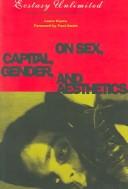
ISBN: 0816619972 0816619964 9780816619979 9780816619962 Year: 1993 Publisher: Minneapolis: University of Minnesota press,
Abstract | Keywords | Export | Availability | Bookmark
 Loading...
Loading...Choose an application
- Reference Manager
- EndNote
- RefWorks (Direct export to RefWorks)
Aesthetics --- Sociology of culture --- United States --- Esthetica --- Esthétique --- Popular culture --- Political culture --- Aesthetics. --- Popular culture - United States. --- Political culture - United States. --- United States of America
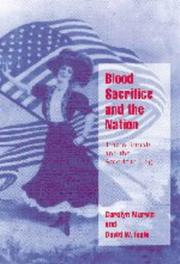
ISBN: 0521626099 0521623456 9780521626095 Year: 1999 Publisher: Cambridge: Cambridge university press,
Abstract | Keywords | Export | Availability | Bookmark
 Loading...
Loading...Choose an application
- Reference Manager
- EndNote
- RefWorks (Direct export to RefWorks)
Flags --- Political culture --- Nationalism --- Totemism --- Sacrifice --- Social aspects --- Flags - Social aspects - United States. --- Political culture - United States. --- Nationalism - United States. --- Totemism - United States. --- Sacrifice - United States.
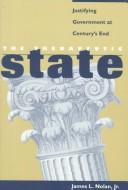
ISBN: 081475791X 9780814757918 Year: 1998 Publisher: New York: New York University press,
Abstract | Keywords | Export | Availability | Bookmark
 Loading...
Loading...Choose an application
- Reference Manager
- EndNote
- RefWorks (Direct export to RefWorks)
Book
ISBN: 9781509510351 9781509510344 1509510354 1509510346 Year: 2018 Publisher: Cambridge (UK): Polity press,
Abstract | Keywords | Export | Availability | Bookmark
 Loading...
Loading...Choose an application
- Reference Manager
- EndNote
- RefWorks (Direct export to RefWorks)
"Lobbying and political interest groups occupy an ambivalent place in advanced democracies. This insightful book injects a new sociological understanding of politics and policy. As the book convincingly reveals, a sociological understanding of lobbying and interest groups illustrates the edges and boundaries of representative democracy itself"--
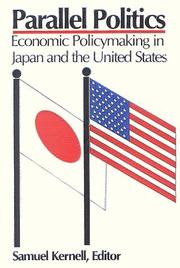
ISBN: 0815748914 9780815748915 Year: 1991 Publisher: Washington (D.C.): Brookings Institution,
Abstract | Keywords | Export | Availability | Bookmark
 Loading...
Loading...Choose an application
- Reference Manager
- EndNote
- RefWorks (Direct export to RefWorks)
Political culture --- eua --- japon --- politique economique --- vsa --- japan --- economisch beleid --- Japan --- United States --- Economic policy --- Politics and government --- Political culture - Japan. --- Political culture - United States.
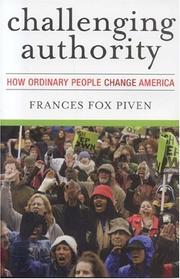
ISBN: 128249631X 9786612496318 0742563405 9780742563407 9781282496316 9780742563162 9780742515352 0742515354 0742563162 6612496312 Year: 2008 Publisher: Lanham : Rowman & Littlefield Publishers,
Abstract | Keywords | Export | Availability | Bookmark
 Loading...
Loading...Choose an application
- Reference Manager
- EndNote
- RefWorks (Direct export to RefWorks)
Argues that ordinary people exercise extraordinary political courage and power in American politics when, frustrated by politics as usual, they rise up in anger and hope, and defy the authorities and the status quo rules that ordinarily govern their daily lives. By doing so, they disrupt the workings of important institutions and become a force in American politics. Drawing on critical episodes in U.S. history, Piven shows that it is in fact precisely at those seismic moments when people act outside of political norms that they become empowered to their full democratic potential.
Civil disobedience - United States. --- Civil disobedience -- United States. --- Elections - United States. --- Elections -- United States. --- Political culture - United States. --- Political culture -- United States. --- Protest movements - United States - History. --- Protest movements -- United States -- History. --- United States -- Political and government -- History. --- United States - Politics and government - History.
Book
ISBN: 0813318874 0813318866 9780813318875 9780813318868 Year: 1993 Volume: *3 Publisher: Boulder: Westview press,
Abstract | Keywords | Export | Availability | Bookmark
 Loading...
Loading...Choose an application
- Reference Manager
- EndNote
- RefWorks (Direct export to RefWorks)
Political participation --- Political culture --- Political leadership --- Public opinion --- United States --- Politics and government --- 1945-1989 --- Political participation - United States --- Political culture - United States --- Political leadership - United States - Public opinion --- Public opinion - United States --- United States - Politics and government - 1945-1989
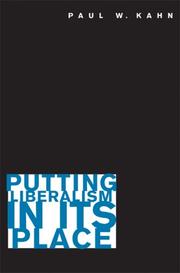
ISBN: 1282086839 9786612086830 1400826314 069113698X 0691120242 9781400826315 9781282086838 9780691136981 9780691120249 Year: 2008 Publisher: Princeton, N.J. ; Woodstock : Princeton University Press,
Abstract | Keywords | Export | Availability | Bookmark
 Loading...
Loading...Choose an application
- Reference Manager
- EndNote
- RefWorks (Direct export to RefWorks)
In this wide-ranging interdisciplinary work, Paul W. Kahn argues that political order is founded not on contract but on sacrifice. Because liberalism is blind to sacrifice, it is unable to explain how the modern state has brought us to both the rule of law and the edge of nuclear annihilation. We can understand this modern condition only by recognizing that any political community, even a liberal one, is bound together by faith, love, and identity. Putting Liberalism in Its Place draws on philosophy, cultural theory, American constitutional law, religious and literary studies, and political psychology to advance political theory. It makes original contributions in all these fields. Not since Charles Taylor's The Sources of the Self has there been such an ambitious and sweeping examination of the deep structure of the modern conception of the self. Kahn shows that only when we move beyond liberalism's categories of reason and interest to a Judeo-Christian concept of love can we comprehend the modern self. Love is the foundation of a world of objective meaning, one form of which is the political community. Arguing from these insights, Kahn offers a new reading of the liberalism/communitarian debate, a genealogy of American liberalism, an exploration of the romantic and the pornographic, a new theory of the will, and a refoundation of political theory on the possibility of sacrifice. Approaching politics from the perspective of sacrifice allows us to understand the character of twentieth-century politics, which combined progress in the rule of law with massive slaughter for the state. Equally important, this work speaks to the most important political conflicts in the world today. It explains why American response to September 11 has taken the form of war, and why, for the most part, Europeans have been reluctant to follow the Americans in their pursuit of a violent, sacrificial politics. Kahn shows us that the United States has maintained a vibrant politics of modernity, while Europe is moving into a postmodern form of the political that has turned away from the idea of sacrifice. Together with its companion volume, Out of Eden, Putting Liberalism in Its Place finally answers Clifford Geertz's call for a political theology of modernity.
Communitarianism --- Liberalism --- Political culture --- Social contract. --- Social compact --- Consensus (Social sciences) --- Political science --- Sociology --- Sovereignty --- Liberal egalitarianism --- Liberty --- Social sciences --- Social structure --- Social contract --- Liberalism - United States --- Communitarianism - United States --- Political culture - United States
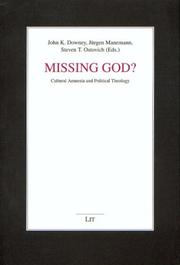
ISBN: 3825876519 9783825876517 Year: 2005 Volume: 30 Publisher: Münster: Lit,
Abstract | Keywords | Export | Availability | Bookmark
 Loading...
Loading...Choose an application
- Reference Manager
- EndNote
- RefWorks (Direct export to RefWorks)
| Listing 1 - 10 of 53 | << page >> |
Sort by
|

 Search
Search Feedback
Feedback About UniCat
About UniCat  Help
Help News
News